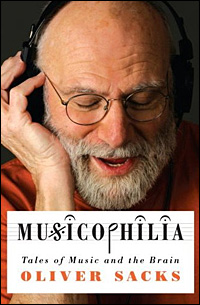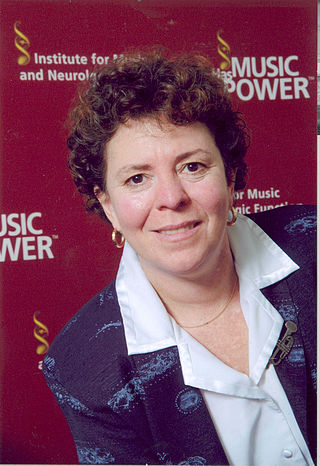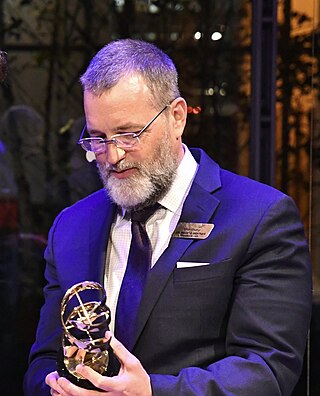
Neurology is the branch of medicine dealing with the diagnosis and treatment of all categories of conditions and disease involving the nervous system, which comprises the brain, the spinal cord and the peripheral nerves. Neurological practice relies heavily on the field of neuroscience, the scientific study of the nervous system.

Dementia is a syndrome associated with many neurodegenerative diseases, which is characterized by a general decline in cognitive abilities that impacts a person's ability to perform everyday activities. This typically involves problems with memory, thinking, behavior, and motor control. Aside from memory impairment and a disruption in thought patterns, the most common symptoms include emotional problems, difficulties with language, and decreased motivation. The symptoms may be described as occurring in a continuum over several stages. Dementia ultimately has a significant effect on the individual, caregivers, and on social relationships in general. A diagnosis of dementia requires the observation of a change from a person's usual mental functioning and a greater cognitive decline than what is caused by normal aging.

UBC Hospital is a teaching hospital located on the University Endowment Lands in Vancouver, British Columbia, Canada. It opened in 1968, and is now operated by Vancouver Coastal Health.
In the management of Parkinson's disease, due to the chronic nature of Parkinson's disease (PD), a broad-based program is needed that includes patient and family education, support-group services, general wellness maintenance, exercise, and nutrition. At present, no cure for the disease is known, but medications or surgery can provide relief from the symptoms.

In 2007, neurologist Oliver Sacks released his book Musicophilia: Tales of Music and the Brain in which he explores a range of psychological and physiological ailments and their intriguing connections to music. It is broken down into four parts, each with a distinctive theme; part one titled Haunted by Music examines mysterious onsets of musicality and musicophilia. Part two A Range of Musicality looks at musical oddities musical synesthesia. Parts three and four are titled Memory, Movement, and Music and Emotions, Identity, and Music respectively. Each part has between six and eight chapters, each of which is in turn dedicated to a particular case study that fit the overarching theme of the section. Presenting the book in this fashion makes the reading a little disjointed if one is doing so cover to cover, however, it also means one may pick up the book and flip to any chapter for a quick read without losing any context. Four case studies from the book are featured in the NOVA program Musical Minds aired on June 30, 2009.

Concetta Tomaino, is the executive director and co-founder of the Institute for Music and Neurologic Function (IMNF). Tomaino is internationally known for her research in the clinical applications of music and neurologic rehabilitation.
John Quinn Trojanowski was an American academic research neuroscientist specializing in neurodegeneration. He and his partner, Virginia Man-Yee Lee, MBA, Ph.D., are noted for identifying the roles of three proteins in neurodegenerative diseases: tau in Alzheimer's disease, alpha-synuclein in Parkinson's disease, and TDP-43 in Amyotrophic Lateral Sclerosis (ALS) and frontotemporal degeneration.

Alzheimer's disease (AD) is a neurodegenerative disease that usually starts slowly and progressively worsens, and is the cause of 60–70% of cases of dementia. The most common early symptom is difficulty in remembering recent events. As the disease advances, symptoms can include problems with language, disorientation, mood swings, loss of motivation, self-neglect, and behavioral issues. As a person's condition declines, they often withdraw from family and society. Gradually, bodily functions are lost, ultimately leading to death. Although the speed of progression can vary, the average life expectancy following diagnosis is three to twelve years.
Sundowning, or sundown syndrome, is a neurological phenomenon associated with increased confusion and restlessness in people with delirium or some form of dementia. It is most commonly associated with Alzheimer's disease but also found in those with other forms of dementia. The term "sundowning" was coined by nurse Lois K. Evans in 1987 due to the timing of the person's increased confusion beginning in the late afternoon and early evening. For people with sundown syndrome, a multitude of behavioral problems begin to occur and are associated with long term adverse outcomes. Sundowning seems to occur more frequently during the middle stages of Alzheimer's disease and mixed dementia and seems to subside with the progression of the person's dementia. People are generally able to understand that this behavioral pattern is abnormal. Research shows that 20–45% of people with Alzheimer's will experience some variation of sundowning confusion. However, despite lack of an official diagnosis of sundown syndrome in the Diagnostic and Statistical Manual of Mental Disorders, Fifth Edition (DSM-5), there is currently a wide range of reported prevalence.

Parkinson's disease (PD), or simply Parkinson's, is a long-term neurodegenerative disease of mainly the central nervous system that affects both the motor system and non-motor systems. The symptoms usually emerge slowly, and as the disease progresses, non-motor symptoms become more common. Usual symptoms are tremor, slowness of movement, rigidity, and difficulty with balance, collectively known as parkinsonism. Parkinson's disease dementia, falls and neuropsychiatric problems such as sleep abnormalities, psychosis, mood swings, or behavioral changes may arise in advanced stages.
The research in Parkinson's disease refers to any study intended to help answer questions about etiology, diagnostic approaches or new treatments of Parkinson's disease (PD) by studying their effects on human subjects. Clinical trials are designed and conducted by scientists and medical experts, who invite participants to undergo testing new vaccines, therapies, or treatments.

Rivastigmine is a cholinesterase inhibitor used for the treatment of mild to moderate Alzheimer's disease. The drug can be administered orally or via a transdermal patch; the latter form reduces the prevalence of side effects, which typically include nausea and vomiting.
Clinical neuroscience is a branch of neuroscience that focuses on the scientific study of fundamental mechanisms that underlie diseases and disorders of the brain and central nervous system. It seeks to develop new ways of conceptualizing and diagnosing such disorders and ultimately of developing novel treatments.
Translational neuroscience is the field of study which applies neuroscience research to translate or develop into clinical applications and novel therapies for nervous system disorders. The field encompasses areas such as deep brain stimulation, brain machine interfaces, neurorehabilitation and the development of devices for the sensory nervous system such as the use of auditory implants, retinal implants, and electronic skins.

The Krembil Research Institute, formerly known as the Toronto Western Research Institute, is an academic medical research institute in Toronto. It is one of the largest research institutes in Canada focusing on human neurological disease.

Giovanna Rachele Mallucci is van Geest Professor of Clinical Neurosciences at the University of Cambridge in England and associate director of the UK Dementia Research Institute at the University of Cambridge. She is a specialist in neurodegenerative diseases.
Ali R. Rezai is an Iranian-born American neurosurgeon and neuroscientist. His work and research has focused on neuromodulation treatments for patients with neurological and mental health conditions, including neuromodulation techniques such as deep brain stimulation (DBS) through brain chip implants to treat Parkinson's disease tremors, obsessive–compulsive disorder, Alzheimer's disease, traumatic brain injury, spinal cord injury, and addiction. Recent research since 2020 has focused on deep brain stimulation for addiction treatment, as well as focused ultrasound to treat tremor, addiction and Alzheimer's disease.

The Rockefeller Neuroscience Institute is an independent, non-profit institution focused on the study of human memory and memory diseases. Founded in 1999, the institute is part of the West Virginia University Medicine Health Sciences Campus, located in Morgantown, West Virginia. The institute is one of the world's leading research centers focusing on innovative procedures to treat Alzheimer's disease and to expand clinical, research and academic missions of neurosurgery, neurology, behavioral medicine, psychiatry and other neuroscience issues.
Isabelle Aubert is a Canadian neuroscientist with expertise in developing regenerative therapies for neurodegenerative disorders. She is a senior scientist at Sunnybrook Research Institute, and is a professor in laboratory medicine and pathobiology at the University of Toronto. In 2019, Aubert was appointed as a Canada Research Chair in Brain Repair and Regeneration.

David Gentner, Ed.D., is an academic and healthcare administrator who serves as the 10th President of Wartburg organizations including IMNF in Mount Vernon, New York. He is the first individual to hold the shared office of President for both Wartburg and Wartburg Foundation.












